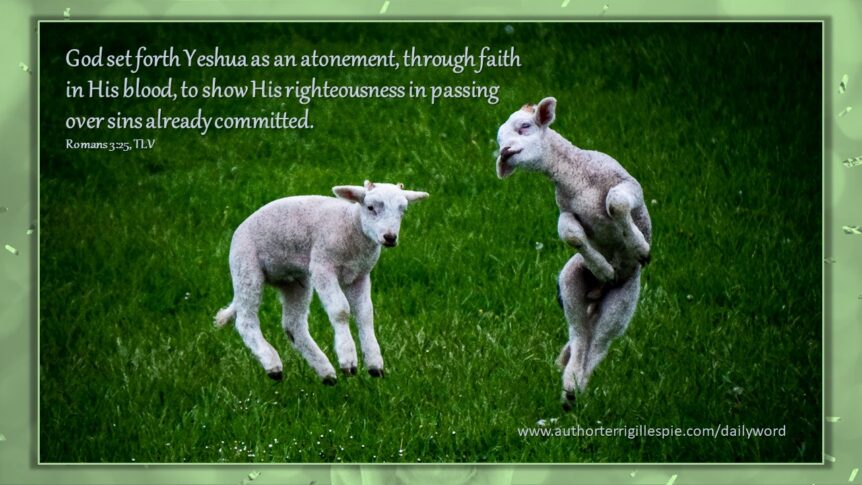God set forth Yeshua as an atonement, through faith in His blood, to show His righteousness in passing over sins already committed. Romans 3:25, TLV

Going a Little Deeper. Beautiful passage. But what does it mean? What is the history behind Paul’s words? It’s interesting that Paul’s epistle to the Romans should contain such Jewish concepts. Atonement. Passing over. Generally, he was careful to not confuse the new Gentiles believers with more complex concepts or Jewish thought as in this verse.
Perhaps because he was a citizen of Rome — a Jewish citizen of Rome (Acts 22:25,28) — he hoped he could speak more purposefully.
What Jesus did on the cross and how we apply that sacrifice in our life, is steeped in Jewish history and Biblical law.
Atonement
Atonement — Yom Kippur — the holiest day of the year in the Jewish Biblical calendar (Leviticus 23:26-32). To atone is to cover. Leviticus 16 goes into vivid detail about the sacrifices centered around two goats. These sacrifices depicted the atoning and forgiveness of Israel’s sin each year by our gracious and merciful Heavenly Father. Israel’s sins were covered for one year. One day, our Father would send His Son as the eternal atonement for our sins (Hebrews 2:17; Hebrews 9).
Passing Over
Passing over — Passover — is how Yeshua’s sacrifice is applied. Passover (Leviticus 23:5-8) was the result of the increasing hardness of Pharaoh’s heart toward the children of Israel. Despite the nine plagues God sent, Egypt’s leader would not let His people go. The tenth and final plague was the most horrible. God would send the angel of death over Egypt to take the firstborn boy of every household—Egyptian or Jewish—unless . . .
The escape from this heartbreaking plague was each Jewish—or Egyptian—household was to apply the blood of a pure, sacrificial lamb on their doorpost. God promised, “The blood will be a sign for you on the houses where you are. When I see the blood, I will pass over you. So there will be no plague among you to destroy you when I strike the land of Egypt.” (Exodus 12:13, TLV)
Head-Scratcher
This morning as I make plans for our congregation’s Passover seder (April 8th), it occurred to me, if the great Creator of the Universe knew where His Jewish people were at any given moment, couldn’t He have just passed over without the blood? Of course He could.
Applying that blood and, by faith, remaining in the house until it was over, were acts of obedience. God’s command to take that hyssop and splash on the blood to their doorposts, was a test of their faith and commitment to Him.
For us today, it’s easy to say “I’m saved because Jesus died for me.” That His blood covers our sin. But what of the obedience to “apply His blood to the doorposts of our hearts”? That deeper level of recognition that if we walked out of the “house” while death made its rounds, we would be in trouble. We are to abide in Yeshua’s covering so that death and judgment passes us by.




